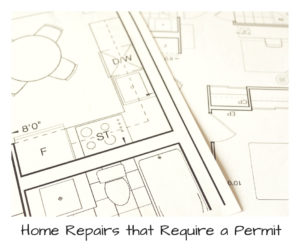 DIY home repairs are much more popular nowadays, thanks to the availability of online tutorials and television shows that make it seem pretty easy. Homeowners can choose to hire a contractor or attempt a DIY on some repairs, so long as they comply with local building laws. Some repairs do require a licensed professional. Below is a closer look at permits and Massachusetts home repairs that require a permit.
DIY home repairs are much more popular nowadays, thanks to the availability of online tutorials and television shows that make it seem pretty easy. Homeowners can choose to hire a contractor or attempt a DIY on some repairs, so long as they comply with local building laws. Some repairs do require a licensed professional. Below is a closer look at permits and Massachusetts home repairs that require a permit.
What is a Permit?
A permit is essentially permission to make certain improvements to your home. You must apply for one through your local building department and pay a fee. Some improvements require building plans to be reviewed and approved. An inspection is required after work is completed (and sometimes at certain stages in between) to confirm that it complies with local building and safety codes.
Typically, when you hire contractors, they will apply for the permit. In doing so, they take responsibility for the work. As a homeowner, you can certainly apply for one yourself under a homeowner exemption, but then you inherit the risk and responsibility.
Massachusetts Home Repairs that Require a Permit
Any alterations to a home’s structure or major systems will require a building permit. Here are some common examples:
- Home Additions
- New Porches or Decks (or Rebuilding of Existing Ones)
- New Structures (Such as a Garage or Shed)
- Roof Replacements or Extensive Repairs
- Window & Door Replacements
- Internal Renovations, which may include
- Removal of Walls
- Re-wiring of Electrical
- Plumbing Updates
- HVAC Replacement
- Replacement of Kitchen Cabinets
- Exterior Siding Work (Including Painting)
Click here for a more comprehensive list of home repairs that require a permit (and also those that do not).
What Happens if You Fail to Obtain a Permit
If you fail to obtain a permit and this is uncovered during construction, several things can happen. First and foremost, your work can be shut down by the city or town until you obtain the necessary permits. You may even be required to re-do the work (to prove you are in compliance with building codes). If the planned renovations are not approved, you may not be allowed to proceed at all. For instance, if you are building a garage and the building department denies the plans, you must tear down whatever work you have already completed.
If un-permitted work is uncovered by the city or town at a later time, you may be fined AND charged back taxes, interest, and fees. This could amount to a legal headache and financial hardship. Although the permitting process can be a bit of a pain, failing to obtain a permit could be much more painful for a homeowner. To protect the value of your home and minimize issues, be sure to follow proper procedure for Massachusetts home repairs that require a permit.


